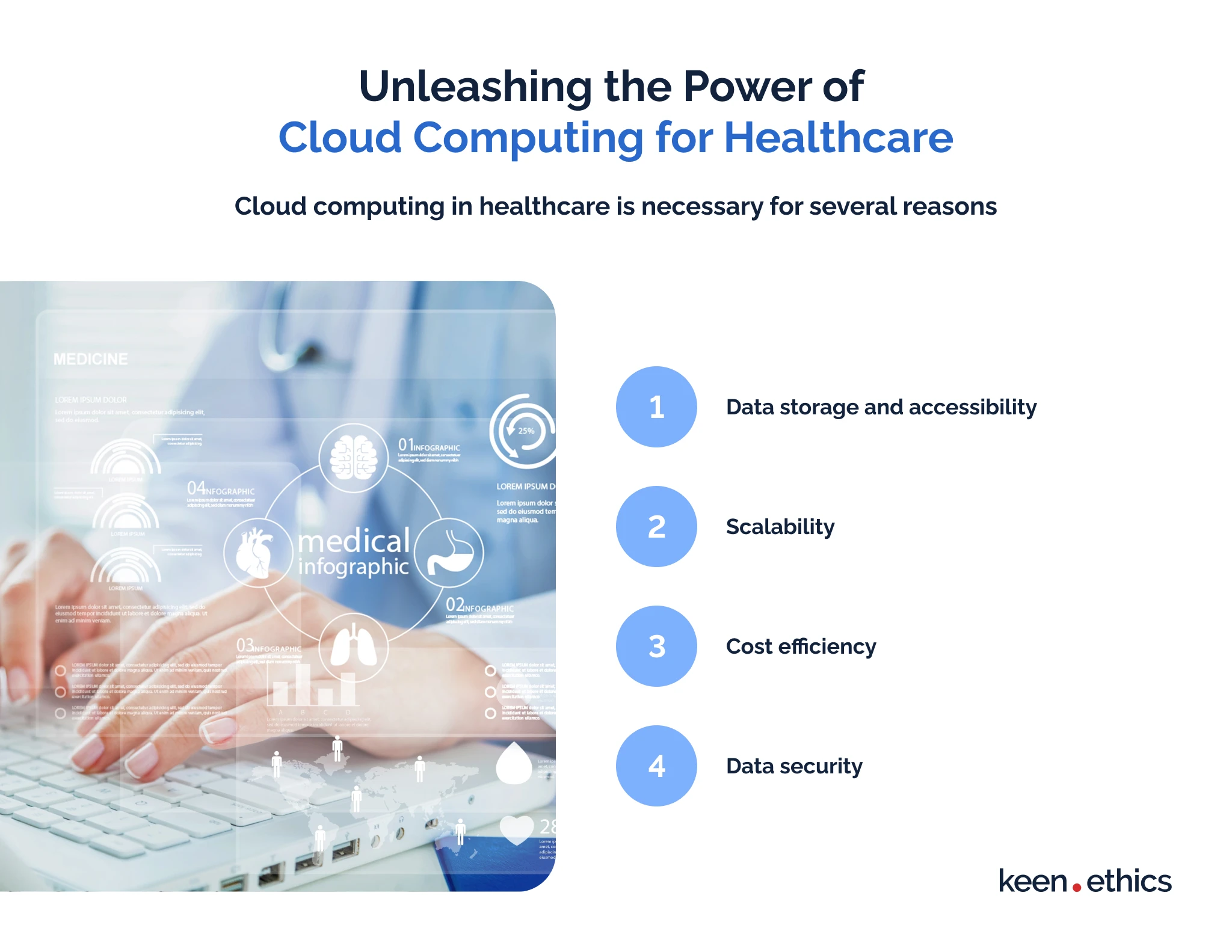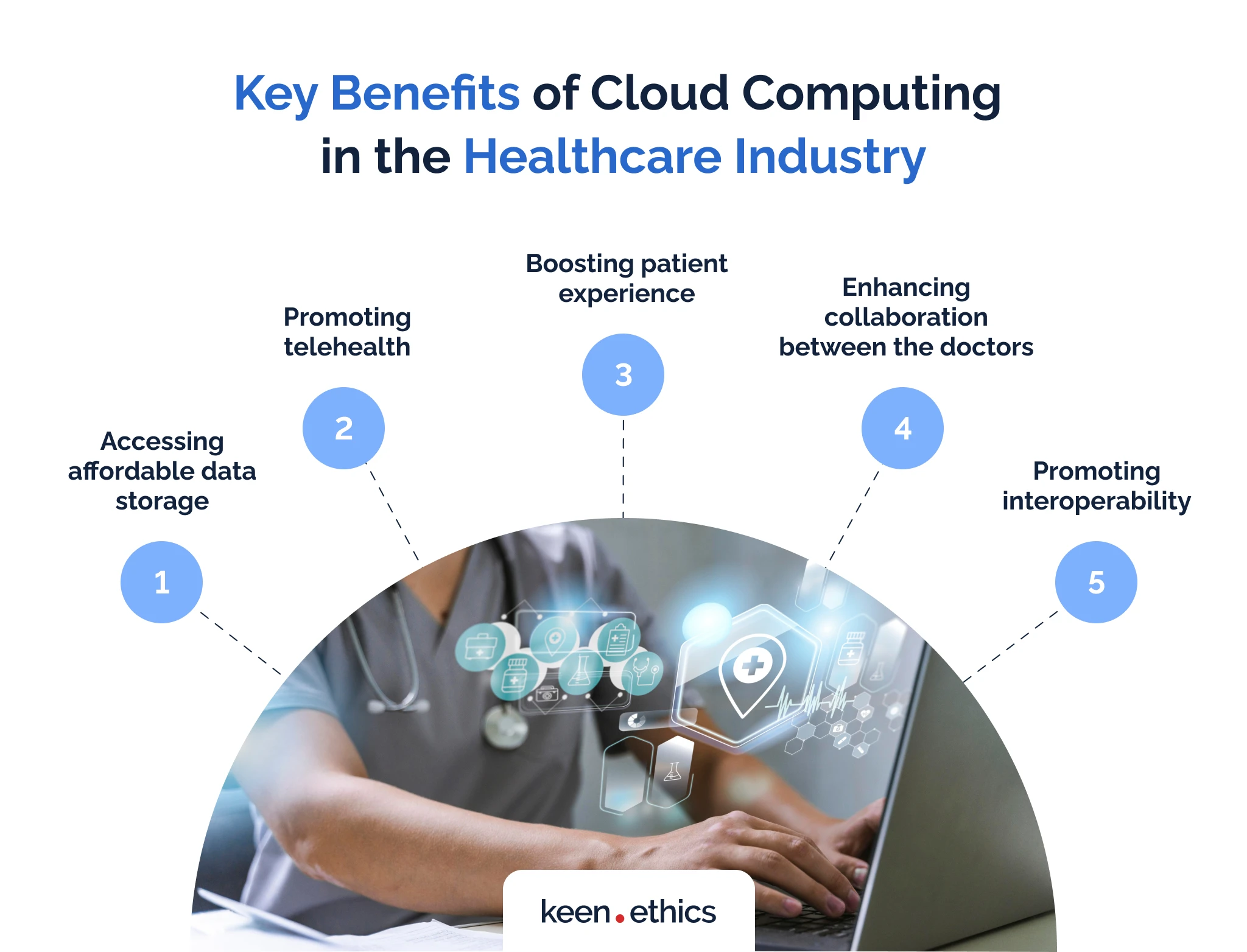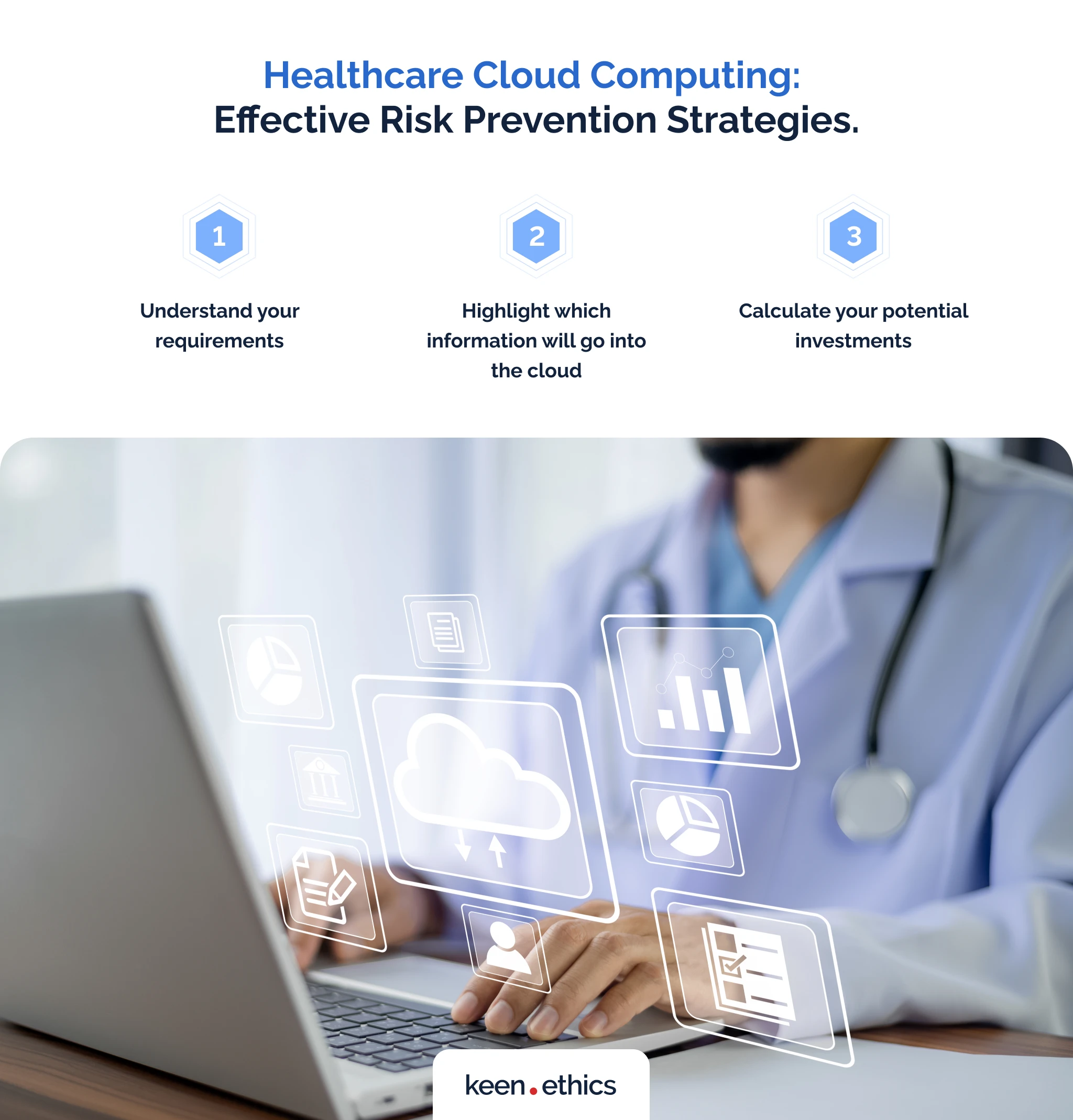Accessing data from many locations is essential for modern healthcare facilities. In this article, we look at the benefits and examples of cloud computing in healthcare.
Healthcare is one of the fields that can benefit even from the smallest improvements. Why? Every new tool offers an opportunity to boost the quality and longevity of patients’ lives. In this regard, the IT field is of great interest. It doesn’t provide direct treatments in the majority of cases. Where informational technologies shine is improving organizational frameworks within the healthcare field. This article looks at a technology that can deliver high-quality improvement. This technology is cloud computing in healthcare. This article reviews the essence of the technology and later transitions into a discussion of its key benefits and issues. Using this information, you can make vital decisions regarding the management of the technology in your business.
What is Cloud Computing in Healthcare?
Before we transition to the potential benefits and negatives of the technology, it’s essential to define it and showcase the place of cloud computing in healthcare. So, what does this technology stand for? According to Amazon AWS, cloud computing in healthcare refers to the use of remote servers and Internet-based services to store, manage, and process healthcare data and apps. It allows healthcare organizations to access and share information securely, collaborate in real time, and deploy scalable computing resources as needed. Cloud computing offers benefits such as cost savings, flexibility, scalability, and enhanced data security, enabling healthcare providers to streamline operations, improve patient care, and facilitate research and innovation.
Unleashing the Power of Cloud Computing for Healthcare

Cloud computing in healthcare is necessary for several reasons:
1) Data storage and accessibility: cloud computing enables healthcare organizations to securely store vast amounts of patient data and access it from anywhere. This approach facilitates seamless information sharing and collaboration among healthcare providers.
2) Scalability: the cloud offers scalable resources, allowing healthcare providers to easily adjust computing power and storage capacity based on their needs. In this way, one ensures they can handle large volumes of data and accommodate growth without significant infrastructure investments. Such an approach is great regarding the preparation for large-scale disasters. In case a crisis such as the coronavirus pandemic returns, one can use cloud services to process large amounts of information. The more data a hospital analyzes, the easier it’s to tackle large-scale crises.
3) Cost efficiency: cloud computing eliminates the need for expensive on-premises hardware and maintenance costs, making it a cost-effective solution for healthcare organizations. The scale of the cloud services is a major advantage for them: they spend less money per storage space than traditional facilities.
4) Data security: as ECPI University notes, cloud computing is crucial for boosting security. Cloud service providers implement robust security measures, including encryption and access controls, to protect sensitive patient information from unauthorized access or breaches. The tools aimed at security available to cloud service providers are difficult to obtain without specialization in this field. In this light, cloud services are more likely to ensure high security than any other services on the market.
Key Benefits of Cloud Computing in the Healthcare Industry

Cloud computing in healthcare is a worthwhile investment. Why? Let’s look at the five key benefits one can get from this field.
1. Accessing affordable data storage
Consumer-based data storage is relatively accessible, indeed. A 1-terabyte hard drive is cheap, and even the most high-quality models cost no more than 100 dollars. The problem is that hospitals need much more. Various imaging technologies used within this sphere take up tremendous amounts of space. This means one has to invest in storage that is much more expensive and, likely, less reliable (due to focusing on the maximization of storage space). Healthcare cloud computing solves this problem once and for all. You don’t have to purchase any hardware. Instead, the cloud service does everything for you. All you have to consider is the safe data storage on the servers.
2. Promoting telehealth
A potent trend in the modern world is the transition of healthcare into the web sector. It’s now possible to offer some treatments via so-called telehealth. This sector amounts to 250 billion dollars in the modern market, according to McKinsey & Company analysis. Telehealth entails communication with a specialist via a web-based platform. Using consumer-oriented video communication isn’t sufficient regarding telehealth. What do we mean by this? Its instruments are often limited. Telehealth needs something more than a video feed. You must invest in the Internet-based infrastructure to provide all the key assistance services for the users. Cloud technologies deliver a perfect opportunity to create a high-quality basis for your online services.
3. Boosting patient experience
A big problem for many patients is sharing information in the traditional hospital systems. To transfer from one doctor to another (even within one hospital), one must overcome a lot of red tape. Cloud computing in healthcare solves this problem once and for all. How does it do it? The technology allows sharing of information among multiple devices without major barriers and without using any tools apart from the Internet.
4. Enhancing collaboration between the doctors
A big aspect in the presented case is the ability to boost cooperation between the doctors. The most notable factor is the ability to spread information among multiple experts. Cloud computing in healthcare enables specialists to share information freely. Why is this so important? Cooperation becomes easy: you can transition data almost instantly, and a colleague can learn about the new patient even before they arrive.
5. Promoting interoperability
Interoperability in healthcare refers to the ability of different healthcare systems and technologies to exchange and utilize patient data efficiently and accurately. Why are cloud systems important for this goal? They promote the storage of all key information on electronic devices. This factor enables people to easily share information between multiple pieces of software. For example, one can interconnect a telehealth framework with the lab test tools to get high-quality insights into the patients’ health.
Evaluating the Potential Challenges of Cloud Computing in Healthcare
All systems have some massive drawbacks disrupting them in long-term scenarios. What are the potential challenges of healthcare cloud computing that you can meet? Let’s review some of the key factors.
1. Restricting data to one storage service
The first problem of cloud computing is that you start to rely on one service. It’s irrational to invest in multiple frameworks. This factor creates a major problem in the long-term scenario. A cloud solution for healthcare can make you rely too much on electronic and Internet-based services. We believe a rational decision is to always consider potential fail-safe solutions. As Mark Dargin notes for Network World, it’s essential to always plan for the potential closure of a cloud service when using one. Every crisis isn’t a matter of possibility but of time.
2. Finding experts
A second challenge with cloud infrastructure is that you can encounter major problems with finding potent specialists. This field is relatively new; in this light, people who can help adjust for the presented services are still rather scarce. You should start looking for professionals working in the sphere of cloud-based systems as early as possible. Keenethics is a company that assists with achieving this goal. If you’re interested, don’t hesitate to contact us.
3. Ensuring security
One of the major problems of cloud computing for healthcare is it’s vulnerability to outside attacks. Why does this matter? The key factor is that hospitals tend to work with vulnerable user information. This means you must consider installing security-centric software from the onset. The benefits of cloud computing in healthcare are large, but their full realization is possible only if you make a major investment into suppressing the potential problems.
4. Preventing the worker resistance
A big problem with installing different IT systems in healthcare lies in the potential resistance of the workers. Some people are conservative about the existing organizational frameworks. In this light, they can suppress all the initiatives you bring in. The promotion of cloud computing for healthcare isn’t only about installing the technology. One also needs to convince and train the majority of the relevant staff. If you use various patient-centric systems, it’s also crucial to consider how you’ll be able to convince the users.
Healthcare Cloud Computing: Effective Risk Prevention Strategies

Despite the benefits of cloud computing in healthcare, it also brings about major problems that one needs to resolve, as the challenge section above indicates. In this regard, we want to offer you an insight into the potential risk prevention methods for healthcare cloud computing:
1. Understand your requirements
Many problems stem from the lack of understanding regarding one’s goals. Hospitals tend to install too many systems and use only some of them. In this light, additional services are a perfect entryway for many criminals. We recommend minimalism: choose only those features that your service truly needs.
2. Highlight which information will go into the cloud
Storing all the data on the cloud isn’t always rational. If you want to ensure the privacy of the patients, it may sometimes be more reasonable to store some information in paper records and some data on the cloud. Decide what is going to transition into the cloud before you invest in cloud technology in healthcare.
3. Calculate your potential investments
One should never go into any innovation-based field without understanding their expenditures. How to avoid this problem? You should clearly outline your needs and realize how the technologies on the market function. In this regard, Keenethics can help your firm. We’re ready to offer free estimates of the relevant project cost. In this way, you can create a definite budget for your product.
Diverse Types of Cloud Computing in the Healthcare Industry
There are multiple types of cloud computing in the healthcare industry. What are those? Let’s review some of the key frameworks you should consider:
Infrastructure as a Service (IaaS)
IaaS provides healthcare organizations with virtualized computing resources such as servers, storage, and networks. It allows them to scale their infrastructure as needed without investing in physical hardware. With IaaS, healthcare providers can easily deliver and manage their computing resources, enabling flexibility, cost savings, and efficient use of IT infrastructure.
Platform as a Service (PaaS)
PaaS offers a platform for healthcare developers to build, test, and deploy apps without worrying about the underlying infrastructure. It provides a complete framework, including development tools, databases, and runtime environments. PaaS streamlines the app development process and allows healthcare organizations to focus on creating innovative solutions rather than managing infrastructure.
Software as a Service (SaaS)
SaaS delivers healthcare apps and software over the Internet on a subscription basis. Healthcare providers can access these apps through web browsers or dedicated client interfaces, eliminating the need for local installation and maintenance. SaaS offers convenience, as updates and maintenance are handled by the service provider, allowing healthcare organizations to focus on delivering quality care.
Hybrid Cloud
A hybrid cloud combines the use of public and private clouds in healthcare. This type of cloud computing in the healthcare industry allows organizations to leverage the benefits of both environments. While public clouds offer scalability, cost-effectiveness, and accessibility, private clouds provide enhanced security and control over sensitive data. A hybrid cloud enables healthcare providers to store sensitive patient data on the private cloud while utilizing the public cloud for non-sensitive apps or storage, striking a balance between security and flexibility. Such an approach enables the users to share all the potential benefits of cloud computing in healthcare.
Related Services
CLOUD APPLICATION DEVELOPMENT COMPANY
Examples of Cloud Computing Adoption in the Healthcare Industry
What’s cloud computing in healthcare? It’s a tool that helps promote Internet-centric software. Let’s look at the examples of products providing an intersection of cloud computing and healthcare:
Epic Systems
Epic offers a cloud-based electronic health record (EHR) system used by many healthcare organizations to store and manage patient data securely. It enables seamless data sharing, streamlines workflows, and improves patient care coordination.
Philips HealthSuite
Philips HealthSuite is a cloud-based platform that supports telehealth and remote patient monitoring. It allows healthcare providers to remotely monitor patients’ vital signs, collect and analyze data, and provide personalized care through connected devices and mobile apps.
Google Cloud Healthcare API
Google Cloud Healthcare API offers a secure and scalable infrastructure for healthcare organizations to manage and analyze healthcare data in the cloud. It enables interoperability between different healthcare systems, simplifies data integration, and supports advanced analytics for research and population health management.
GE Healthcare Centricity
GE Healthcare Centricity is a suite of cloud-based solutions for healthcare organizations, including EHR, imaging, and clinical collaboration tools. It enables efficient data exchange, enhances clinical decision-making, and improves patient outcomes through the seamless integration of various healthcare apps and systems.
How Can Keenethics help?
To create a high-quality cloud-based computing integration, one needs the help of professionals. In this respect, our company is here to assist you. What do we offer in this regard? Keenethics helps with developing and integrating different types of cloud computing in healthcare. How much does an average app cost? Everything depends on your needs. We can tell that an hour of work on the part of our specialists costs between 25 and 50 dollars. If you’re interested, we estimate the potential costs on our website.
Conclusion
To summarize, investing in cloud computing for healthcare services is an interesting choice. If you want to boost the information processing capabilities of your facility, we believe that such a framework is a perfect choice. Our company helps with creating these solutions. You can contact us to create a potent product for this goal.
Common Questions About Cloud Computing in Healthcare
Why use cloud computing in healthcare?
Cloud computing in healthcare offers benefits such as cost savings, scalability, improved collaboration, and enhanced data security and accessibility.
What are the best cloud computing frameworks for healthcare?
Some of the best cloud computing frameworks for healthcare include Amazon Web Services (AWS), Microsoft Azure, Google Cloud Platform (GCP), and IBM Cloud.
What tendencies exist in cloud computing for healthcare?
Some trends in cloud computing for healthcare include increased adoption of hybrid cloud, focus on data security and privacy, and advancements in interoperability standards.
Contact us to get the relevant assistance.

























